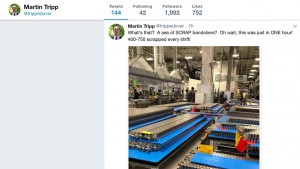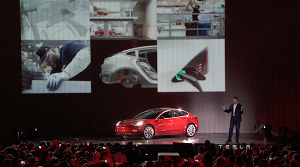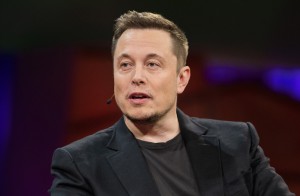Forget the amusement park. Anyone who wants to ride a roller-coaster might be better off purchasing Tesla stock. But no one has faced more ups-and-downs during the last year than the automaker’s co-founder and CEO Elon Musk.
Even as Tesla appears to be resolving its production problems and seems poised to deliver a long-promised profit, the automaker and its CEO are facing a probe by the SEC, lawsuits filed by several short-sellers, additional investigations by the NLRB, NHTSA and the NTSB, and allegations of safety and quality problems by several self-styled whistleblowers.
No wonder, “This past year has been the most difficult and painful year of my career,” Musk said in an interview newly published by the New York Times. “It was excruciating.”
And it could be soon to get worse.
Few public figures, other than perhaps President Donald Trump, have more effectively used Twitter to reach beyond their nominal audiences. Musk’s regular tweets, backed up by lengthier blog posts, have turned him into not only the public face of Tesla but also the poster child for the emerging electric vehicle market.
(To get the latest update on Tesla, Click Here.)
But while some observers have seen his use of social media as a positive, it has also created some headaches. The 47-year-old executives came under sharp criticism when, last month, he attacked one of the divers involved in the rescue of a young soccer team trapped in a flooded Thai cave. Now, Musk is facing even more headaches after dropping a bombshell in an Aug. 7 tweet indicating his plan to take Tesla private, at $420 a share. Of particular concern: his declaration, “Funding secured,” which appeared to set off a rush to buy Tesla stock before trading was briefly halted on the NASDAQ exchange.

Another Tripp tweet. He also sent out a list of VINs covering vehicles allegedly using bad batteries.
That, and a subsequent blog post that indicated Musk was referencing a July 31 meeting with officials from a Saudi Arabian sovereign investment fund that actually did not result in any firm privatization plan, could create serious headaches for both the CEO and Tesla. The SEC could levy hefty fines and even move to restrict Musk’s future activities. The courts, meanwhile, could find that Tesla is responsible for significant losses by short-sellers.
When one adds in the year-long battle to resolve what Musk previously described as “production hell” at the Tesla plant in Fremont, California, it’s no surprise he admitted that he has been facing physical exhaustion. “I’ve had friends come by who are really concerned.” The Times also quoted several unnamed sources indicating some members of the Tesla board have grown concerned about Musk’s use of the sleep aid Ambien.
There have been signs that the Tesla board may be growing worried, more broadly, about the potential problems Musk – and his propensity to tap out tweets – may be causing. Among other things, three independent members have been appointed to review any final plan Musk delivers. And the board, not Musk, will make the final decision on whether to move ahead with privatization.
During the hour-long interview, the Times reported, Musk “alternated between laughter and tears,” but he also retained the defiant tone that has marked his rise up the Silicon Valley food chain, the immigrant entrepreneur originally making his fortune as a co-founder of PayPal.
There is no question that his devotion to Tesla – and his other ventures, the Boring Company and SpaceX – consume Musk who said he has often worked as much as 120 hours a week, noting “There were times when I didn’t leave the factory for three or four days — days when I didn’t go outside.” It’s one factor in the break-up of his most recent marriage and, “has really come at the expense of seeing my kids. And seeing friends.”
(Click Here for more about the rally and fall of Tesla stock.)
That doesn’t mean Musk has abandoned his private life entirely. He has been dating the pop singer who goes by the stage name “Grimes.” In fact, the fateful tweet about taking Tesla private, he revealed to the Times, came shortly after the two woke up at his suburban Los Angeles mansion. Musk did a brief workout and, as he headed to the airport for an early flight, he started typing.

After its debut of the Model 3, Tesla was plagued with production problems forcing it to miss several production deadlines.
Musk’s subsequent blog post attempted to clarify the reasoning behind that original tweet, but the fact is that specific details of his plan – or whatever idea he has so far formulated – remain in short supply. As has often been the case, Musk sidestepped the traditional route for a public company, filing extensively detailed documentation with the SEC before going public. Now, that agency is gearing up to get answers and if it is not pleased with what it sees there could be some serious blowback.
One of the questions is whether Musk can justify his actions by pointing to a clear plan. Skeptics contend he may have acted in order to hammer the short-sellers who have become the bane of his existence, counting on Tesla’s collapse. Musk acknowledged he has faced, “at least a few months of extreme torture from the short-sellers, who are desperately pushing a narrative that will possibly result in Tesla’s destruction.”
There is little doubt the Tesla board is now worried about the mess the privatization tweet could cause. During the interview, Musk was asked if he regretted his tweet and responded, “Why would I?” He also said he had no intention of backing off of his frequent use of social media. But the Times noted that it subsequently received a call from a Tesla spokesperson indicating Musk had agreed not to post again about the privatization without first discussing the matter with the board.
The good news for Musk and company is that operations at the Fremont plant, as well as Tesla’s Gigafactory battery plant, appear to be coming together. A team of analysts from financial firm Evercore ISI this week reported on a visit to the assembly line, indicating Model 3 production is steadily increasing, something critical to the profit Musk has promised.
But the CEO’s headaches aren’t over. A former employee Tesla has labeled a “saboteur” has also gone to the SEC as a whistleblower, outlining what he claims are quality problems and rigged production numbers. This week, Martin Tripp himself took to Twitter, posting pics of allegedly defective batteries used in production vehicles and backing those up with vehicle identification numbers.
Several other self-styled whistleblowers have also gone public, echoing Tripp’s claims.
Meanwhile, at least two lawsuits have been filed against Tesla by short-sellers. And the company faces a series of other possible legal headaches, including a case before the National Labor Relations Board looking into the mass firing of Fremont workers in 2016 that, Tesla critics contend, was motivated by their support for a union drive.
Even before the privatization tweet stirred things up, Musk had a premonition that appears likely to prove accurate.
(Musk, Tesla board move forward with privatization plan. Click Here for the story.)
“I thought the worst of it was over — I thought it was,” he said, referring to production of the Model 3.. “The worst is over from a Tesla operational standpoint. But from a personal pain standpoint, the worst is yet to come.”


Silence is golden.
This is the best example of self inflicting pain by talking too much…
Agree cheng, was thinking the same.
He’s rather Trumpish and Giuliani-ish isn’t he?